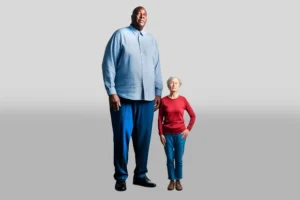Is confidence determined by height? In a world where height often correlates with power and presence, it’s easy to assume taller individuals feel more self-assured. Yet, height alone doesn’t shape one’s confidence. Many factors, including societal perception, personal self-worth, and the way individuals carry themselves, play a bigger role. This article examines how height influences confidence and whether it’s truly the deciding factor.
Height and Societal Perceptions of Confidence
Society has long associated height with authority, leadership, and confidence. Research supports this. A 2013 study published in Psychological Science found that taller individuals, especially men, are often perceived as more confident and capable. This perception is deeply ingrained in various areas of life, including the workplace and media representation.
Example 1: Workplace Bias Tall people are more likely to be seen as leaders. Studies, such as one from Malcolm Gladwell’s Blink, reveal that a higher percentage of Fortune 500 CEOs are taller than the average person. Height is subconsciously linked with authority, making it more likely for taller individuals to be promoted to leadership positions.
Example 2: Pop Culture Bias In pop culture, taller actors and models are often portrayed as powerful figures. Actors like Dwayne Johnson (The Rock) and Gal Gadot are seen as symbols of strength and confidence. However, there are shorter actors, like Tom Cruise and Kevin Hart, who’ve redefined this perception, proving that confidence doesn’t rely solely on height.
Personal Confidence: What Really Builds It?
While height may impact first impressions, lasting confidence is built from inner qualities and self-belief. Many short individuals develop immense confidence despite societal biases.
Example 1: Short Individuals Overcoming Bias Tom Cruise, at 5’7″, has become a global superstar, embodying confidence and action-hero roles. Similarly, Kevin Hart, who stands at 5’5″, has consistently joked about his height in his comedy routines while building a confident, strong persona in Hollywood.
Example 2: Research Findings A study from the University of Groningen highlights that confidence is not just tied to appearance but also to achievements. People who are focused on personal growth and accomplishments often exude confidence, no matter their height.
How Body Language Can Help You “Stand Tall”
Confidence comes from more than height—it comes from how you carry yourself. Even if you’re shorter, your posture and body language can make a big difference.
- Stand Straight: Good posture is a quick way to feel and appear more confident. By standing up straight, pulling your shoulders back, and keeping your head high, you naturally exude strength and assertiveness.
- Eye Contact: Confident people maintain strong eye contact. This simple act can immediately make you seem more approachable and self-assured.
- Use Gestures: Tall or short, the way you use your hands and gestures in conversations matters. Engaging others with open, broad movements shows confidence.
Confidence in Shorter People: More Common Than You Think
Many people who feel insecure about their height work on their personality and skills to build confidence. This sense of achievement can actually make shorter individuals more resilient.
Example 1: Short Kings Movement The recent social media trend #ShortKings, popularized on TikTok and Instagram, celebrates shorter men who embrace their height with pride. This has helped challenge societal norms and empowered short men to redefine masculinity and confidence.
Example 2: Celebrities Redefining Height Stereotypes Short actors like Daniel Radcliffe (5’5″) have embraced their height and used it to their advantage. Radcliffe is often cast in roles that allow him to shine through his talent, not just his physical presence, proving that self-assurance comes from skill and mindset.
Is There Really a Height-Confidence Connection?
In reality, height influences perception, but confidence stems from within. A tall person may initially be seen as confident, but without inner self-assurance, that perception may fade. Conversely, a shorter person can easily overcome biases with strong personal confidence.
Example 1: Self-Acceptance as a Key to Confidence Whether tall or short, self-acceptance plays a major role in shaping confidence. People who focus on their strengths, rather than fixating on height, tend to be happier and more confident. Recognizing that height is only one part of who you are can lead to stronger self-esteem.
Example 2: Emotional Resilience Short individuals often develop resilience from navigating societal biases. This resilience can translate into greater self-confidence, as they learn to overcome challenges and prove their worth through actions, not appearance.
Confidence Is More Than Height
In the end, height can shape initial impressions, but it doesn’t define long-term confidence. True confidence comes from self-awareness, achievements, and how you carry yourself. Standing tall is a mindset, not just a physical trait. Whether you’re tall or short, embracing your unique qualities and focusing on inner growth will lead to a stronger, more confident self.
Takeaways:
- Height might influence first impressions, but confidence comes from inner qualities and accomplishments.
- Body language, posture, and self-acceptance play a significant role in building confidence.
- Both tall and short individuals can overcome societal biases and develop lasting confidence through personal growth.



